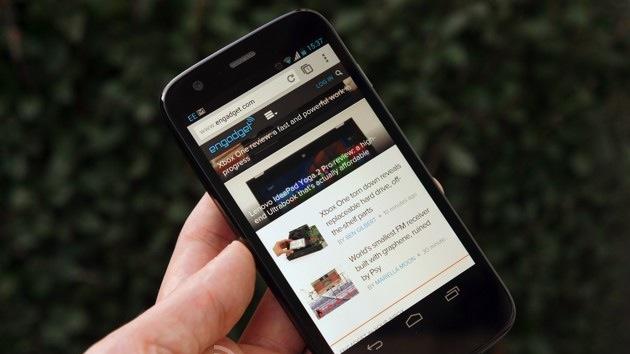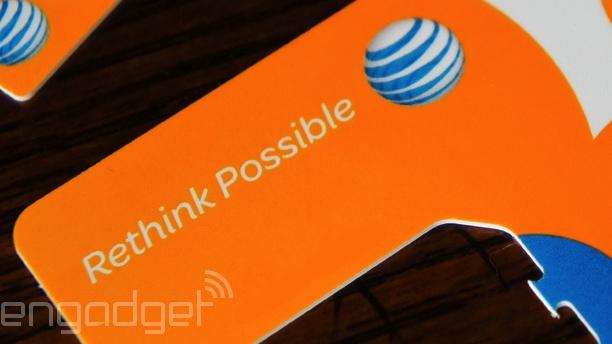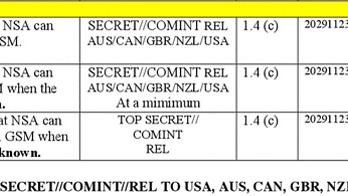cellphone
Latest

Google reportedly wants to offer mobile phone service in Fiber areas
Many see Google Fiber as an attempt to disrupt the stagnant world of internet service providers, and it now sounds like Google wants to shake up the wireless industry, too. Sources for The Information claim that the search firm wants to offer mobile phone service in Fiber areas. It's not yet clear how this would work, but Google reportedly told Verizon in January that it would like to become an MVNO (mobile virtual network operator) piggybacking on Big Red's network. None of the companies involved are commenting on the rumor, and there are no guarantees that Google's dreams will become reality. We certainly wouldn't count on Verizon's cooperation given its vehement opposition to the net neutrality principles that Larry Page and crew hold dear. However, Google is the sort of company that's willing to supply internet access by any means necessary -- if it's really bent on offering phone service, it'll find a way.

Study claims kill switch for stolen cellphones could save $2.5 billion per year
It's easy to understand the personal benefits of a potential kill switch requirement for cellphones; thieves would have less incentive to swipe your handset if they knew that it would become a brick. However, Creighton University professor William Duckworth has conducted a study suggesting that a remote shutdown feature could also save phone users a lot of money. Based on a 1,200-person survey, he estimates that consumers could avoid spending a total of $2.5 billion per year -- $500 million in buying replacement phones, and $2 billion in insurance that covers theft. The savings would be good news for customers, though not the carriers and insurers that earn revenue from the status quo.

Japanese phones will soon get alerts for inbound missiles and other attacks
The Japanese get phone alerts for natural disasters, but they have more than that to worry about these days with an occasionally belligerent North Korea just a stone's throw away. Accordingly, Japan's Fire and Disaster Management Agency says that it will soon warn phone owners when there's a hostile missile launch, a terrorist attack or a similar human-made threat to their region. The new alerts will use the disaster technology from before, so residents won't have to worry about software upgrades when the warning system takes effect on April 1st. Locals hopefully won't ever see the system put to use, but it's good to know that it exists. [Image credit: Ignat Gorazd, Flickr]

EU law to require that all cellphones charge through a common standard
The EU successfully pushed for voluntary adoption of a cellphone charging standard a few years ago, and it's now close to making that standard mandatory. The European Parliament has voted in favor of a draft law requiring that cellphones work with a common charger. Provided the Council of Ministers green lights the regulation, EU countries will have until 2016 to put it into their local laws; phone makers will have until 2017 to change their hardware. The charger requirement is a formality when many phone designers already support the concept, but it could force some companies to shape up -- and spare more Europeans from tossing out power adapters when they switch handsets. [Image credit: Thierry Monasse/AFP/Getty Images]

We now spend more time using smartphones than surfing the web on PCs
It's no secret that mobile devices outsell PCs these days. However, we now know that they're taking up more of our free time, too. A new Nielsen study finds that Americans, Brits and Italians spend more hours using their smartphones in a given month than they do surfing the web from computers. The gap is particularly wide in Italy, where locals spend 37 hours per month on their phones versus a mere 18 hours browsing from their PCs. Not surprisingly, social networking is the biggest lure -- users spend roughly a quarter of their phone time using Facebook, Twitter and other social apps. While it's doubtful that every country will be quite so eager to ditch the desktop, it's clear that companies will have to focus more of their efforts on mobile if they really want our attention.

Nokia is reportedly unveiling its low-end Android phone this month
If you're eager to get an officially sanctioned glimpse at Nokia's rumored Android cellphone, you may not have to wait long. Sources speaking to the Wall Street Journal claim that Nokia will unveil the low-end handset, currently nicknamed Normandy, at Mobile World Congress later this month. The tipsters haven't shed new light on the hardware itself, but they support beliefs that the device's customized interface will revolve around Microsoft and Nokia services while stripping out Google content. If the leak is accurate, Microsoft may be in an awkward position once it closes its acquisition of Nokia's phone business -- it might have to sell a phone using the very platform it has been trying to destroy. [Image credit: @evleaks, Twitter]

New AT&T plan makes it cheaper to share smartphone data off-contract
AT&T's current Mobile Share plans can be quite expensive for families and small offices that don't want to be tied to a contract. However, service is potentially more affordable through a new plan launching Sunday. The tier starts at $130 per month with two off-contract lines for new customers (existing contract customers can also sign up) and 10GB of shared data, but it costs a more modest $15 per extra line instead of the regular $25; the carrier reckons that a family of four could save anywhere from $40 to $100 per month over the regular rates. You can go for more than 10GB of data if your clan craves extra bandwidth, too. It's not clear if AT&T's deal will be enough to lure families away from low-cost carriers like T-Mobile, but it's certainly a better offer than before.

US Cellular offers $50 unlimited plan with throttled data as a catch
You won't have to endure data caps if you want cheap phone service at US Cellular. The carrier has just launched a promo plan that offers unlimited internet access, messaging and voice for $50 per month without a contract. There is a big gotcha, though -- US Cellular will start throttling data speeds after the first 500MB, which rules it out for movie fans and others who need a lot of bandwidth. Still, it's worth a look if you're keen to both lower your bill and avoid those dreaded overage fees. [Image credit: Vincent Desjardins, Flickr]

Canada's Wind Mobile offers unlimited US roaming for $15 extra per month
Canadians frequently have to pay through the nose to use their phones in the US; at best, they'll get a paltry 50MB of data per day. They won't have that problem for long, though, since Wind Mobile is launching an unlimited US roaming plan on February 3rd. For $15 extra per month, subscribers will get to use as much data, text messaging and voice as they like while visiting their American neighbors. This isn't as sweet a deal as T-Mobile USA's free basic data, but it's still a huge bargain for traveling Canucks who'd rather not deal with an outrageous phone bill when they get home.

IBM's speedy graphene chip could lead to super-efficient mobile devices
Chips with graphene inside are theoretically quicker than plain silicon designs, but they've been slow in practice; the manufacturing process often damages the graphene, stripping away its speed advantage. That won't be a big problem with IBM's prototype radio receiver, though. The company inserted graphene transistors into the new chip only after it finished assembling the mostly silicon design, keeping the more exotic material intact. The resulting integrated circuit is about 10,000 times more powerful than previous parts, IBM claims. The test unit hasn't done more than send a text message so far, but it could lead to future wireless radios that are both faster and consume less power. If you eventually get a graphene-powered smartphone with great data speeds and a long battery life, you'll know who to thank.

Globalstar's new service turns your WiFi device into a satellite phone
Your choices for satellite communication devices are relatively limited, especially if you'd prefer to use your own gear while chatting in the wilderness. You're going get a much wider selection of hardware once Globalstar's Sat-Fi service goes live, though. The subscription offering revolves around a satellite hotspot (not yet pictured) that lets you make calls and send data on Globalstar's network using most any WiFi-capable device. You can share the connection between multiple gadgets, and you can even use an existing phone number. Just be patient if you're eager to sign up for an always-available data link. The company doesn't expect the FCC to approve the hotspot until some time in the second quarter of the year, and you'll have to wait until shortly afterward to use the service itself.

TV stations try sharing their airwaves to make room for 4G traffic
TV stations selling spectrum in the FCC's upcoming wireless auction may soon have a viable alternative to moving or shutting down their channels. Two Los Angeles broadcasters, KJLA and KLCS, have agreed to participate in a CTIA-backed pilot project that will test whether or not they can share airspace without interference. If the trial is successful, stations will have much more incentive to give up their frequencies for the sake of phone carriers eager for 4G bandwidth -- networks will get to both keep their channels as well as reduce their operating costs in the process. Cellular providers will have to wait patiently for results, though, as the trial will run through the first quarter of the year.

Verizon plan lets you send unlimited international texts for $5 per month
If you like to text friends and family overseas, you know that it can be expensive -- US carriers frequently charge either per text or for blocks of messages that aren't always enough. Pricing won't be a problem if you sign up for Verizon's new World Messaging Unlimited plan, though. As the name implies, the $5 add-on lets you send as many messages as you like to most countries. It also drops the per-minute voice rates to a penny when calling Canada or Mexico, and 5 cents for the rest of the Americas. Verizon describes the unlimited plan as a promotional offer; while there isn't a clear expiry date, we'd suggest acting quickly if you want to chat with the rest of the planet.

Verizon adds 250MB Share Everything plan for the extra-thrifty
Verizon's Share Everything plans may be convenient for multi-phone households, but they're not cheap -- even the 500MB tier can be pricey for those who don't need much data. To that end, the carrier is introducing a $20, 250MB shared data plan on January 21st. The new offering shaves about $20 off the base rate, and lets a single smartphone owner pay as little as $60 per month for full service; a customer with a basic phone pays $50 per month. With that said, the plan isn't exactly the bargain of the century. AT&T offers a slightly better 300MB for the same money, and 250MB is likely to run out quickly if there's at least one smartphone in the mix. It may be worth investigating what Sprint and T-Mobile have to offer if you want more data without paying a lot more for the privilege.

Supreme Court to determine if police need warrants to search cellphones
It's now clear that police don't need a warrant to track your cellphone, but searching that phone is another matter; there's no obvious guiding policy. Any murkiness may be settled soon, as the Supreme Court has agreed to rule on two cases where the accused have objected to cops obtaining evidence from their phones without warrants. Decisions in either case could set precedents for searches across the US; if judges determine that warrants are necessary, they could challenge guidelines in California and other places that allow warrantless searches after arrests. The court hasn't scheduled the relevant hearings, though, so it may be a while before there are any definitive answers. [Image credit: Erin Nekervis, Flickr]

AT&T will give you up to $450 to leave T-Mobile
AT&T is clearly worried that T-Mobile's recent success may be coming at its own expense -- it just launched a promotion that gives T-Mobile customers up to $450 to switch to Big Blue. The deal offers converts a minimum of $200 once they've subscribed to a smartphone plan, plus up to $250 more if they trade in an existing phone. There's no mention of when the promo will end, although it's described as a "limited time" offer. The deal may be tempting if you're already inclined to jump ship, although you'll want to do the math before you leave. While AT&T will now cut your bill when off-contract, T-Mobile's contract-free rates could be lower depending on the device you buy; it may be cheaper in the long run.

AT&T echoes Verizon with plans to publish reports on law enforcement data requests
Sometimes, peer pressure can be a beautiful thing. Just hours after Verizon said it would start publishing transparency reports, AT&T has followed suit with plans of its own. Big Blue will largely mirror its rival's moves and publish a semi-annual internet report that breaks down law enforcement requests by type, such as court orders. The initial study, due in early 2014, will summarize the telecom provider's 2013 data. We'd note that AT&T is reversing its attitude from just days earlier, when it was hostile toward shareholders that wanted a similar level of accountability. Still, we don't mind the contradiction if it brings more government surveillance activity to light -- even if it doesn't address thornier issues like warrantless wiretapping.

Verizon to publish regular reports on government data requests
Numerous tech giants have been eager to publish what they can about government data requests, but telecoms haven't been so forthcoming. Verizon is breaking some ground, though, with plans to publish semi-annual transparency reports starting in early 2014. While the reports will mostly reflect information that the carrier has already been publishing in some form, the data will be more accessible and consistent than before. Much like Google, Verizon plans to break down requests by type, such as court orders and warrants. It's also asking the government if it can be more precise with the number of National Security Letters it received last year. Although it's doubtful that the reports will reveal everything that the public would like to know, they represent a big step forward for a communications industry that many believe is too eager to cooperate with government eavesdroppers.

US creates the most e-waste, cellphones top the heap
We've known for years about the growing volume of electronic waste, but a new UN study suggests that the situation is only getting worse -- and that the US is largely to blame. The organization says that Americans created the most e-waste in 2012, at 9.4 million metric tons. The country produced no more than 2.2 million tons in 2005. China was the runner-up at 7.2 million tons, but it also has a much larger population; researches estimate that the US generated nearly 30 tons of waste per person versus just 5.4 in China. As to why Americans have so much tech junk? Most likely, it stems from an obsession with cellphones. A simultaneous study from MIT and the US National Center for Electronics Recycling shows that handsets represented 120 million of the 258.2 million used electronic devices in the US during 2010, and that ratio likely isn't getting any smaller. Whatever the cause, developing countries have to bear the brunt of our e-waste; MIT notes that most used gadgets leaving the US are going to China and Latin America. And that's only counting trackable shipments -- both the UN and MIT believe that there are many gaps in their data, which hints that the problem is considerably worse. [Image credit: Curtis Palmer, Flickr]

NSA can decode many GSM cellphone calls
The NSA may say that its phone surveillance efforts focus on metadata rather than the associated calls, but we now know that the agency can listen to many of those conversations whenever it wants. Documents leaked to the Washington Post by Edward Snowden confirm that the NSA can decode GSM-based cellphone calls without obtaining the encryption keys. The ability isn't surprising when GSM has known weaknesses, but the document suggests that the NSA (and potentially other US agencies) can easily process cellphone calls worldwide. Not surprisingly, the intelligence branch argues that such cracking is necessary -- folks on both sides of the law use encryption to hide information, after all. The NSA may not have such an easy time in the future, however. AT&T, T-Mobile Germany and other carriers worldwide are moving to tougher encryption methods for their GSM service, and 3G calls are typically more secure as a matter of course. These measures don't prevent eavesdropping, but they do complicate any attempts to snoop on cellular chats.
